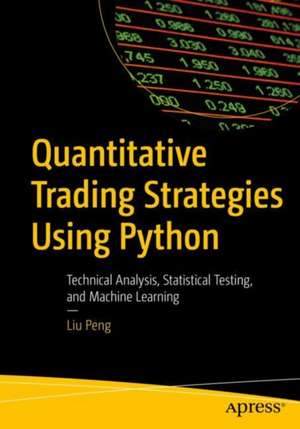Quantitative Trading Strategies Using Python: Technical Analysis, Statistical Testing, and Machine Learning
Autor Peng Liuen Limba Engleză Paperback – 10 sep 2023
Part one of Quantitative Trading Strategies with Python covers the fundamentals of trading strategies, including an introduction to quantitative trading, the electronic market, risk and return, and forward and futures contracts. Part two introduces common trading strategies, including trend-following, momentum trading, and evaluation process via backtesting. Part three covers more advanced topics, including statistical arbitrage using hypothesistesting, optimizing trading parameters using Bayesian optimization, and generating trading signals using a machine learning approach.
Whether you're an experienced trader looking to automate your trading strategies or a beginner interested in learning quantitative trading, this book will be a valuable resource. Written in a clear and concise style that makes complex topics easy to understand, and chock full of examples and exercises to help reinforce the key concepts, you’ll come away from it with a firm understanding of core trading strategies and how to use Python to implement them.
What You Will Learn
- Master the fundamental concepts of quantitative trading
- Use Python and its popular libraries to build trading models and strategies from scratch
- Perform data analysis and visualization, algorithmic trading, backtesting, risk management, optimization, and machine learning for trading strategies using Python
- Utilize common trading strategies such as trend-following, momentum trading, and pairs trading
- Evaluate different quantitative trading strategies by applying the relevant performance measures and statistics in a scientific manner during backtesting
Aspiring quantitative traders and analysts, data scientists interested in finance, and researchers or students studying quantitative finance, financial engineering, or related fields.
Preț: 265.92 lei
Preț vechi: 332.40 lei
-20% Nou
Puncte Express: 399
Preț estimativ în valută:
50.89€ • 54.41$ • 42.43£
50.89€ • 54.41$ • 42.43£
Carte disponibilă
Livrare economică 27 martie-10 aprilie
Preluare comenzi: 021 569.72.76
Specificații
ISBN-13: 9781484296745
ISBN-10: 1484296745
Pagini: 337
Ilustrații: XI, 337 p. 102 illus., 90 illus. in color.
Dimensiuni: 178 x 254 mm
Greutate: 0.61 kg
Ediția:First Edition
Editura: Apress
Colecția Apress
Locul publicării:Berkeley, CA, United States
ISBN-10: 1484296745
Pagini: 337
Ilustrații: XI, 337 p. 102 illus., 90 illus. in color.
Dimensiuni: 178 x 254 mm
Greutate: 0.61 kg
Ediția:First Edition
Editura: Apress
Colecția Apress
Locul publicării:Berkeley, CA, United States
Cuprins
Chapter 1: Introduction to Quantitative Trading.- Chapter 2: Understanding the Electronic Market.- Chapter 3: Understanding Risk and Return.- Chapter 4: Forward and Futures Contracts.- Chapter 5: Trend Following Strategy.- Chapter 6: Momentum Trading Strategy.- Chapter 7: Backtesting A Trading Strategy.- Chapter 8: Statistical Arbitrage with Hypothesis Testing.- Chapter 9: Optimizing Trading Strategies with Bayesian Optimization.- Chapter 10: Optimizing Trading Strategies with Machine Learning.
Notă biografică
Peng Liu is an assistant professor of quantitative finance (practice) at Singapore Management University and an adjunct researcher at the National University of Singapore. He holds a Ph.D. in statistics from the National University of Singapore and has ten years of working experience as a data scientist across the banking, technology, and hospitality industries. Peng is the author of Bayesian Optimization (Apress, 2023).
Textul de pe ultima copertă
Build and implement trading strategies using Python. This book will introduce you to the fundamental concepts of quantitative trading and shows how to use Python and popular libraries to build trading models and strategies from scratch. It covers practical trading strategies coupled with step-by-step implementations that touch upon a wide range of topics, including data analysis and visualization, algorithmic trading, backtesting, risk management, optimization, and machine learning, all coupled with practical examples in Python.
Part one of Quantitative Trading Strategies with Python covers the fundamentals of trading strategies, including an introduction to quantitative trading, the electronic market, risk and return, and forward and futures contracts. Part II introduces common trading strategies, including trend-following, momentum trading, and evaluation process via backtesting. Part III covers more advanced topics, including statistical arbitrage using hypothesistesting, optimizing trading parameters using Bayesian optimization, and generating trading signals using a machine learning approach.
Whether you're an experienced trader looking to automate your trading strategies or a beginner interested in learning quantitative trading, this book will be a valuable resource. Written in a clear and concise style that makes complex topics easy to understand, and chock full of examples and exercises to help reinforce the key concepts, you’ll come away from it with a firm understanding of core trading strategies and how to use Python to implement them.
You will:
Whether you're an experienced trader looking to automate your trading strategies or a beginner interested in learning quantitative trading, this book will be a valuable resource. Written in a clear and concise style that makes complex topics easy to understand, and chock full of examples and exercises to help reinforce the key concepts, you’ll come away from it with a firm understanding of core trading strategies and how to use Python to implement them.
You will:
- Master the fundamental concepts of quantitative trading
- Use Python and its popular libraries to build trading models and strategies from scratch
- Perform data analysis and visualization, algorithmic trading, backtesting, risk management, optimization, and machine learning for trading strategies using Python
- Utilize common trading strategies such as trend-following, momentum trading, and pairs trading
- Evaluate different quantitative trading strategies by applying the relevant performance measures and statistics in a scientific manner during backtesting
Caracteristici
Covers quantitative trading, algorithmic trading, risk management, and optimization Provides a balance between theory and practice, with supporting exercises to reinforce the key concepts Offers a comprehensive introduction to quantitative trading strategies using Python
